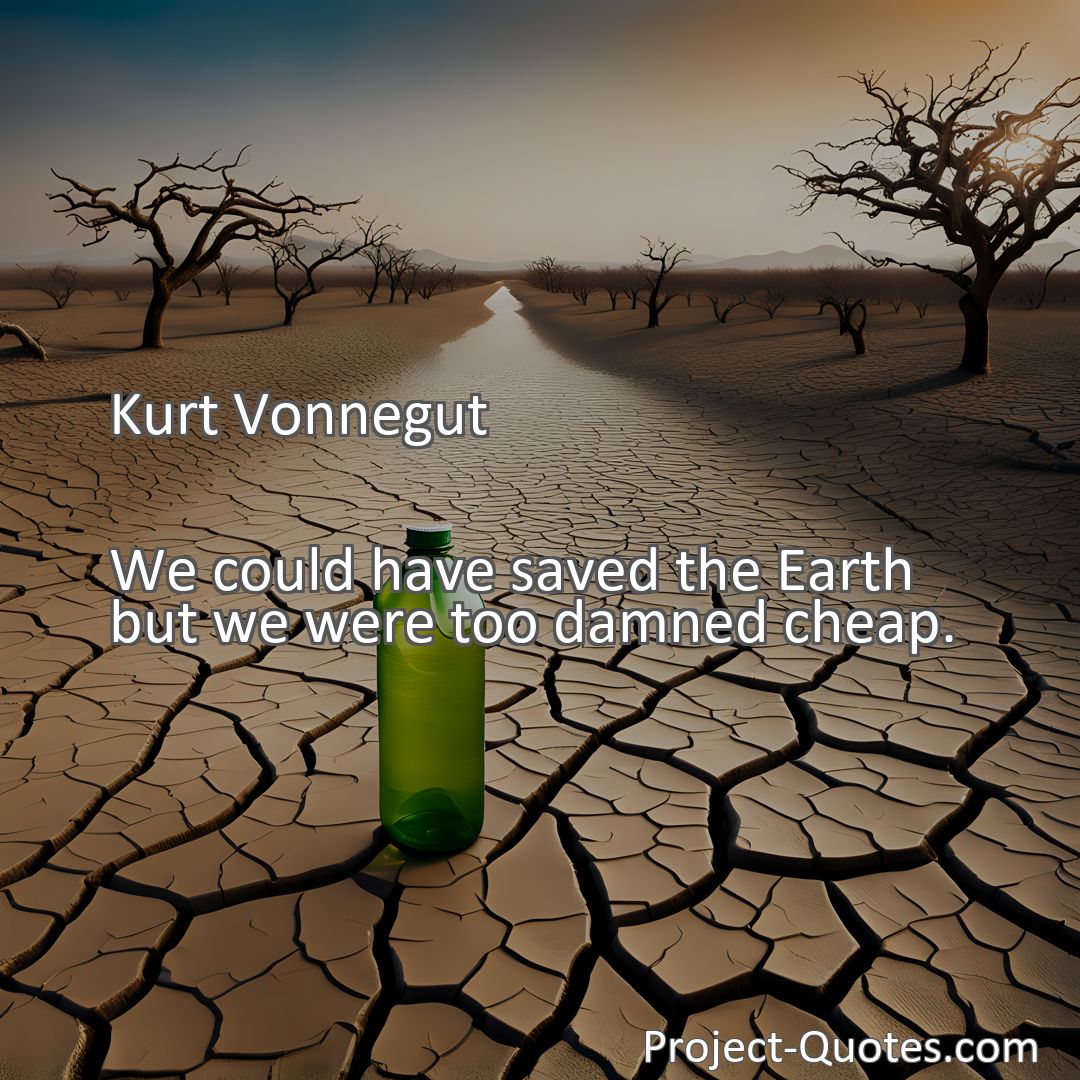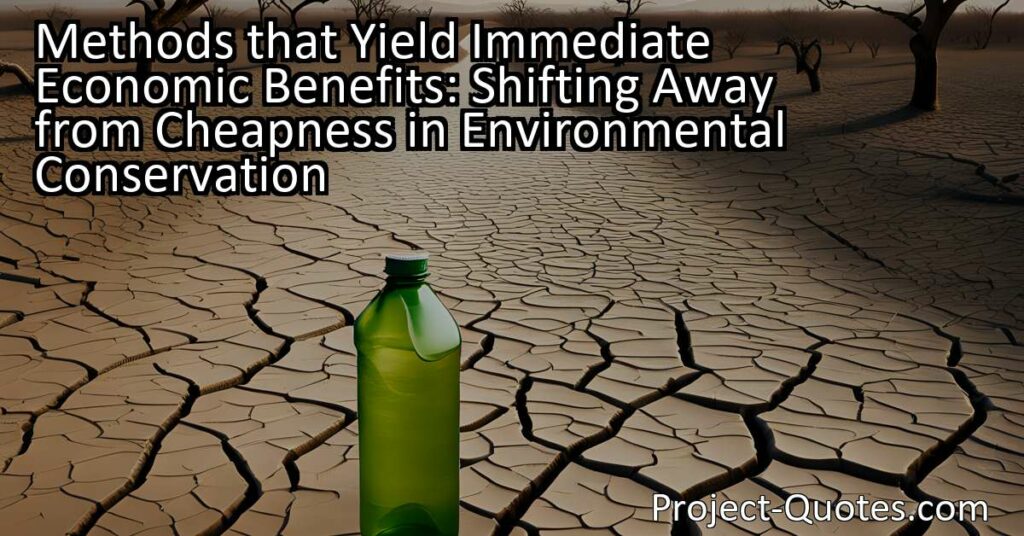We could have saved the Earth but we were too damned cheap.
Kurt Vonnegut
The content discusses how methods that prioritize cheapness in environmental conservation may yield immediate economic benefits but have severe long-term consequences. By shifting away from this mentality and investing in the well-being of our planet, we can achieve a sustainable future for generations to come.
Table of Contents
Meaning of Quote – We could have saved the Earth but we were too damned cheap.
In the arena of environmental conservation, there is a quote by the celebrated author Kurt Vonnegut that resonates with a straightforward truth: “We could have saved the Earth but we were too damned cheap.” Embedded within these few words lies a powerful message reminding us of the missed opportunities and the dire consequences that follow when we prioritize monetary gain over the well-being of our planet.
Vonnegut’s words encapsulate the idea that the ability to save our planet lies within our reach, but our unwillingness to invest the necessary time, effort, and resources prevents us from doing so. In today’s world, where economic considerations often take precedence over environmental concerns, this quote serves as a sobering reminder of the choices we have made and continues to encourage us to rethink our priorities.
The phrase “too damned cheap” goes further than merely stating that we have prioritized finances over the environment; it highlights the failure of our society to acknowledge the long-term consequences of our actions. Cheapness implies a lack of foresight, an unwillingness to invest in the future. It represents a mindset that values short-term gains over the sustainability of our planet.
Our society’s foray into cheapness can be traced through various sectors that have negatively impacted the environment for the sake of economic savings. One striking example is the rampant exploitation of natural resources. Corporations, driven by profit margins, have resorted to unsustainable practices such as deforestation, overfishing, and excessive resource extraction. These methods may yield immediate economic benefits, but they have severe repercussions for long-term ecological balance, biodiversity, and overall planetary health.
Another realm reflecting our “too damned cheap” attitudes is the energy sector. While renewable energy sources present a sustainable path forward, the dominance of fossil fuels has persisted due to their cost-effectiveness and established infrastructure. Despite the overwhelming scientific consensus on the detrimental effects of greenhouse gas emissions, our reliance on cheap and easily accessible fossil fuels showcases our economic bias rather than a genuine concern for the environment.
Furthermore, our disposable culture has perpetuated a throwaway mindset that exacerbates environmental degradation. The proliferation of single-use items, plastic waste, and excessive packaging reflects our short-sighted desire for convenience and affordability. In our pursuit of cheap and easily accessible products, we have disregarded the long-lasting consequences for our planet, resulting in landfills overflowing with non-biodegradable waste and marine life suffering from plastic pollution.
However, it is important to acknowledge that the responsibility for change lies not solely with corporations and industries. Each individual possesses the power to make choices that contribute positively to the environment. Unfortunately, the “too damned cheap” mentality has also influenced the general public. Many hesitate to adopt sustainable habits, such as reducing energy consumption, recycling, or supporting environmentally responsible businesses, due to perceived inconveniences or additional cost implications.
But what if we were to shift our mindset and view these actions as investments rather than expenses? Investing in the environment offers substantial returns in the form of cleaner air, improved public health, and a more balanced ecosystem. By recognizing the long-term benefits of sustainable practices, we can begin to break free from the shackles of cheapness and cultivate a society that prioritizes the protection and preservation of our planet.
Education plays a crucial role in combating our “too damned cheap” mentality. By providing individuals, particularly young students, with knowledge about environmental issues, we can nurture a generation that understands the importance of making responsible choices. Through literacy programs, schools can incorporate lessons on environmental conservation, sparking discussions and enabling students to critically reflect on the consequences of their actions.
Moreover, governments must take decisive action to promote sustainable practices and discourage cheapness. Encouraging investment in renewable energy sources, implementing effective recycling programs, and incentivizing environmentally friendly behavior are just a few ways to bring about significant change. By aligning economic incentives with sustainable practices, policymakers can create a framework that supports forward-thinking initiatives and fosters a transition away from the “too damned cheap” mindset.
Ultimately, saving the Earth requires a collective effort from all sectors of society. We must address the root causes of our cheapness, reevaluate our consumer habits, and hold corporations accountable for their environmental impact. Every individual has a role to play, whether it involves reducing personal carbon footprints, supporting sustainable businesses, or advocating for policy changes.
In conclusion, Kurt Vonnegut’s quote, “We could have saved the Earth but we were too damned cheap,” provides us with a disheartening yet empowering insight into the environmental challenges we face today. It serves as a reminder that our choices matter and that the path to a sustainable future requires a reevaluation of our priorities. By moving away from cheapness and investing in the well-being of our planet, we can forge a path toward environmental stewardship and ensure a brighter future for generations to come.
I hope this quote inspired image brings you hope and peace. Share it with someone who needs it today!


